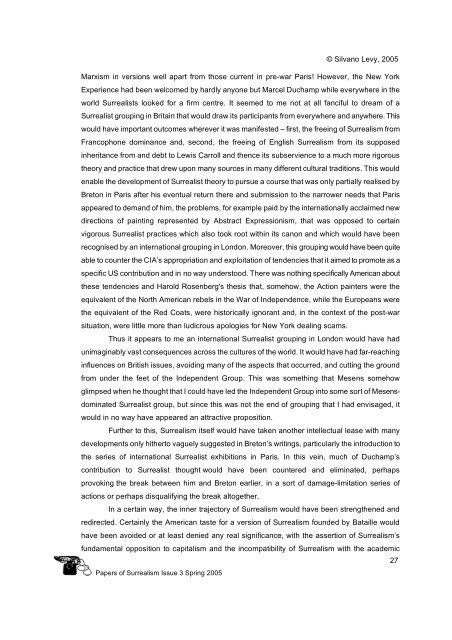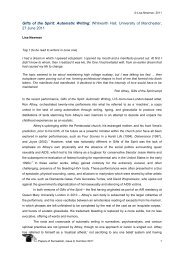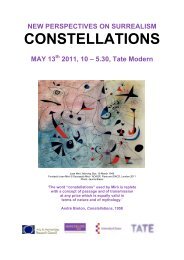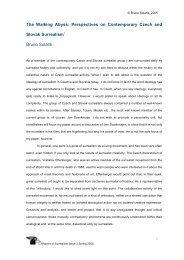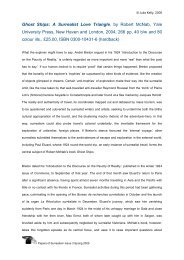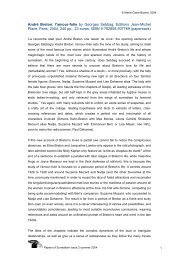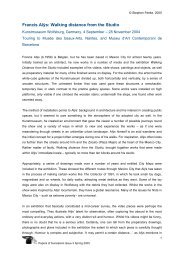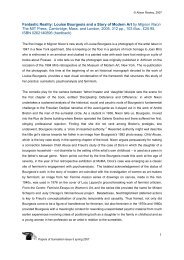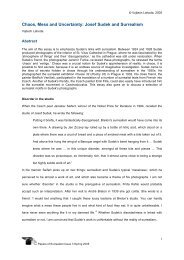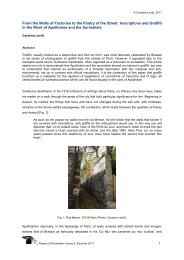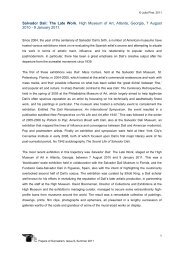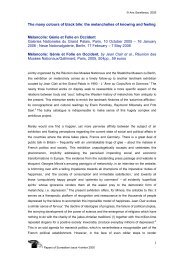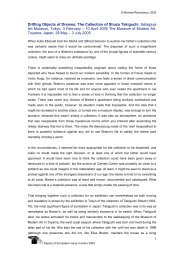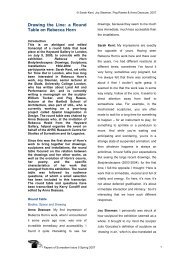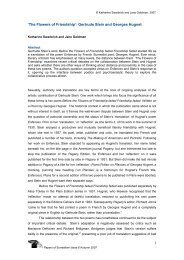The del Renzio Affair: A leadership struggle in wartime surrealism
The del Renzio Affair: A leadership struggle in wartime surrealism
The del Renzio Affair: A leadership struggle in wartime surrealism
Create successful ePaper yourself
Turn your PDF publications into a flip-book with our unique Google optimized e-Paper software.
© Silvano Levy, 2005<br />
Marxism <strong>in</strong> versions well apart from those current <strong>in</strong> pre-war Paris! However, the New York<br />
Experience had been welcomed by hardly anyone but Marcel Duchamp while everywhere <strong>in</strong> the<br />
world Surrealists looked for a firm centre. It seemed to me not at all fanciful to dream of a<br />
Surrealist group<strong>in</strong>g <strong>in</strong> Brita<strong>in</strong> that would draw its participants from everywhere and anywhere. This<br />
would have important outcomes wherever it was manifested – first, the free<strong>in</strong>g of Surrealism from<br />
Francophone dom<strong>in</strong>ance and, second, the free<strong>in</strong>g of English Surrealism from its supposed<br />
<strong>in</strong>heritance from and debt to Lewis Carroll and thence its subservience to a much more rigorous<br />
theory and practice that drew upon many sources <strong>in</strong> many different cultural traditions. This would<br />
enable the development of Surrealist theory to pursue a course that was only partially realised by<br />
Breton <strong>in</strong> Paris after his eventual return there and submission to the narrower needs that Paris<br />
appeared to demand of him, the problems, for example paid by the <strong>in</strong>ternationally acclaimed new<br />
directions of pa<strong>in</strong>t<strong>in</strong>g represented by Abstract Expressionism, that was opposed to certa<strong>in</strong><br />
vigorous Surrealist practices which also took root with<strong>in</strong> its canon and which would have been<br />
recognised by an <strong>in</strong>ternational group<strong>in</strong>g <strong>in</strong> London. Moreover, this group<strong>in</strong>g would have been quite<br />
able to counter the CIA’s appropriation and exploitation of tendencies that it aimed to promote as a<br />
specific US contribution and <strong>in</strong> no way understood. <strong>The</strong>re was noth<strong>in</strong>g specifically American about<br />
these tendencies and Harold Rosenberg's thesis that, somehow, the Action pa<strong>in</strong>ters were the<br />
equivalent of the North American rebels <strong>in</strong> the War of Independence, while the Europeans were<br />
the equivalent of the Red Coats, were historically ignorant and, <strong>in</strong> the context of the post-war<br />
situation, were little more than ludicrous apologies for New York deal<strong>in</strong>g scams.<br />
Thus it appears to me an <strong>in</strong>ternational Surrealist group<strong>in</strong>g <strong>in</strong> London would have had<br />
unimag<strong>in</strong>ably vast consequences across the cultures of the world. It would have had far-reach<strong>in</strong>g<br />
<strong>in</strong>fluences on British issues, avoid<strong>in</strong>g many of the aspects that occurred, and cutt<strong>in</strong>g the ground<br />
from under the feet of the Independent Group. This was someth<strong>in</strong>g that Mesens somehow<br />
glimpsed when he thought that I could have led the Independent Group <strong>in</strong>to some sort of Mesensdom<strong>in</strong>ated<br />
Surrealist group, but s<strong>in</strong>ce this was not the end of group<strong>in</strong>g that I had envisaged, it<br />
would <strong>in</strong> no way have appeared an attractive proposition.<br />
Further to this, Surrealism itself would have taken another <strong>in</strong>tellectual lease with many<br />
developments only hitherto vaguely suggested <strong>in</strong> Breton’s writ<strong>in</strong>gs, particularly the <strong>in</strong>troduction to<br />
the series of <strong>in</strong>ternational Surrealist exhibitions <strong>in</strong> Paris. In this ve<strong>in</strong>, much of Duchamp’s<br />
contribution to Surrealist thought would have been countered and elim<strong>in</strong>ated, perhaps<br />
provok<strong>in</strong>g the break between him and Breton earlier, <strong>in</strong> a sort of damage-limitation series of<br />
actions or perhaps disqualify<strong>in</strong>g the break altogether.<br />
In a certa<strong>in</strong> way, the <strong>in</strong>ner trajectory of Surrealism would have been strengthened and<br />
redirected. Certa<strong>in</strong>ly the American taste for a version of Surrealism founded by Bataille would<br />
have been avoided or at least denied any real significance, with the assertion of Surrealism’s<br />
fundamental opposition to capitalism and the <strong>in</strong>compatibility of Surrealism with the academic<br />
27<br />
Papers of Surrealism Issue 3 Spr<strong>in</strong>g 2005


